Songs of the IBM
 Dfg
Admin
Dfg
Admin
This is an actual book btw.

A few years ago there came into my possession a curious piece of IBM history, a thin paperback volume of 54 pages, privately printed, entitled “Songs of the IBM, 1937 Edition”. The opening page lays out the context:
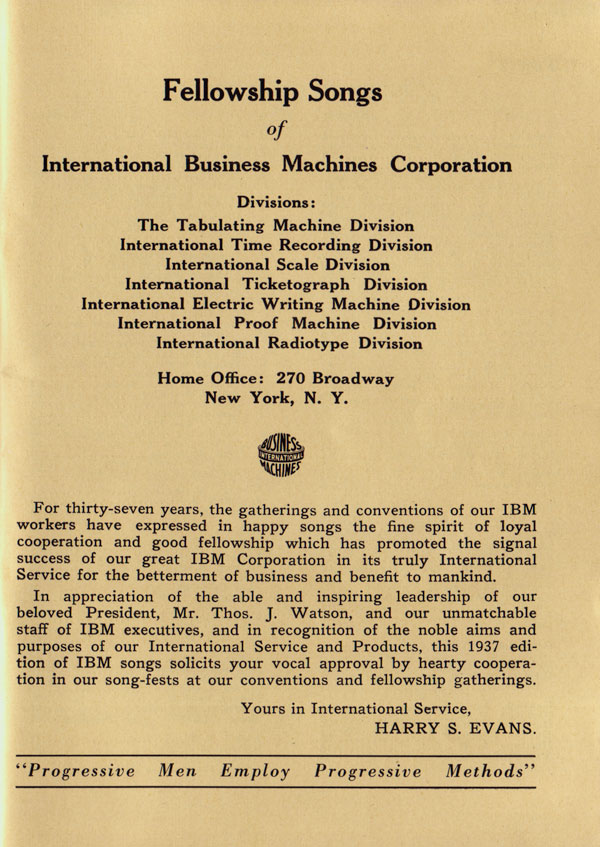
Here’s the index of the 100 songs contained.
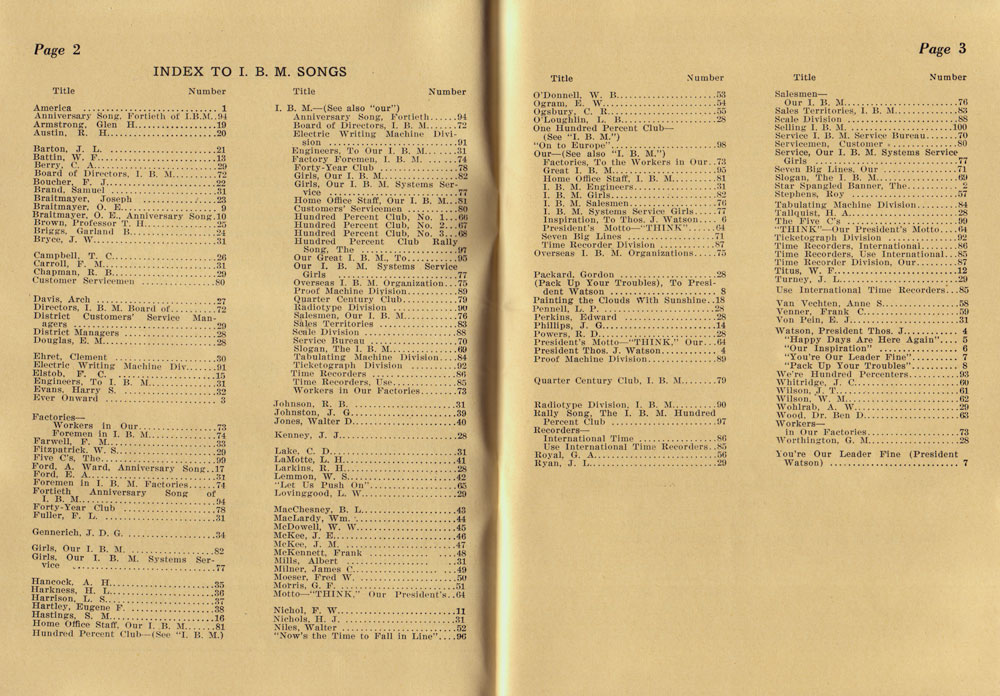
After some patriotic songs, it moves to the “I.B.M. Rally Song” called “Ever Onward”:
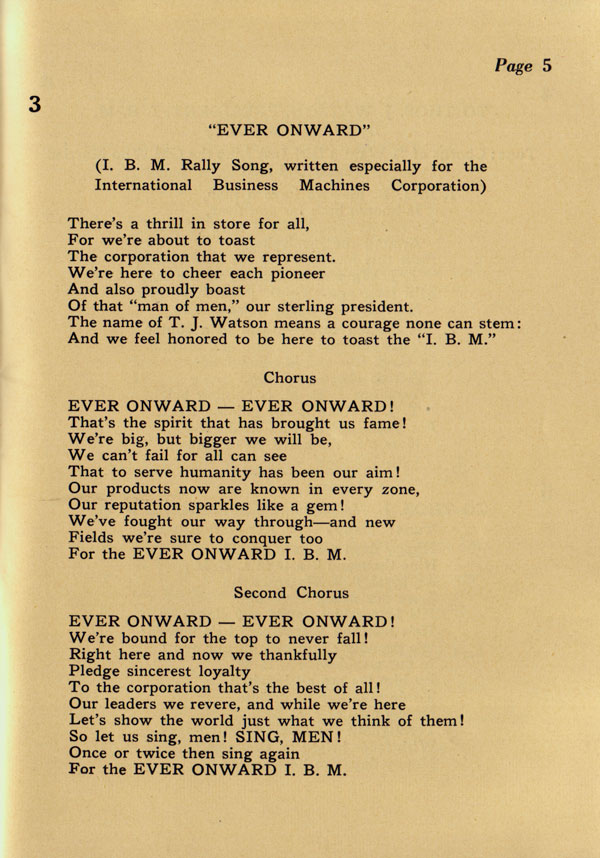
And then it moves to a series of songs praising Thomas J. Watson. At that point I had an uncomfortable feeling about this. Masses of people singing the praises of their leaders and pledging loyalty is something that is historically tainted. We just don’t do that today, at least not outside of North Korea. But we must be cautious if we try to read 1942 into 1937. In the days before television, and when radio was still young, group singing, to a piano or small band was quite common. Some readers might remember this even reaching into the television era with NBC’s “Sing Along with Mitch” show.
The tradition at IBM was started by Harry Evans in 1925, the man who made IBM sing. Literally. In “The Maverick and his Machine”, Kevin Maney describes: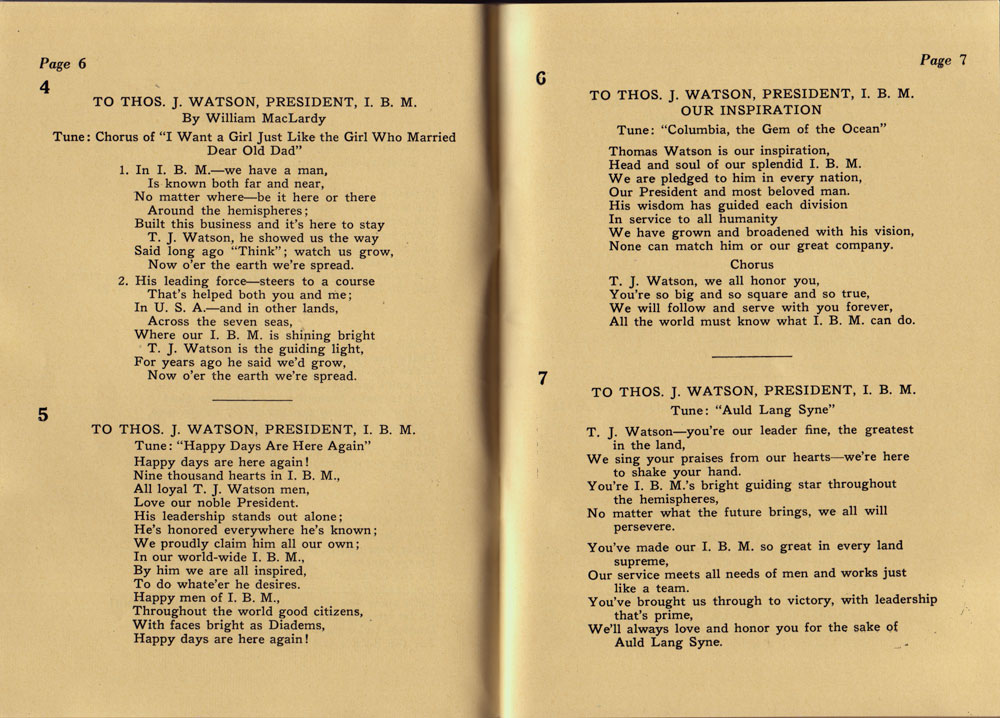
It was not only the IBM President who had a song. Members of the executive team each had a song, including on to “F.C. Elstob, Comptroller”. How often do you see a song written to honor a comptroller? Not very often.
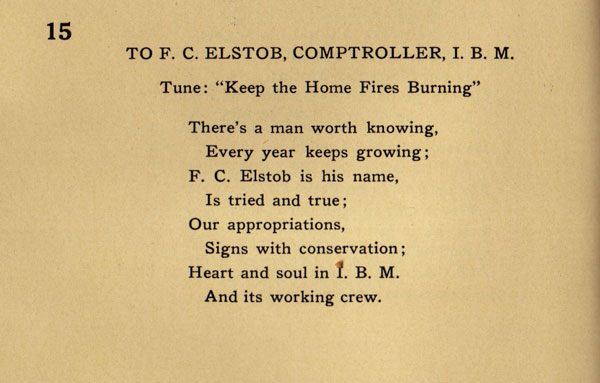
Innovation and patents were important to IBM, even in 1937, as shown in this song, dedicated to “W.M Wilson, Manager, Patent Department”:
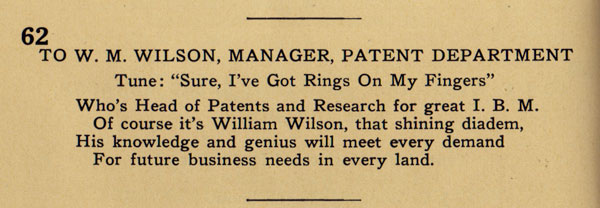
Many of us know of the “THINK” motto that Watson popularized. But did you know there was a song, sung to the tune of “Yankee Doodle”?
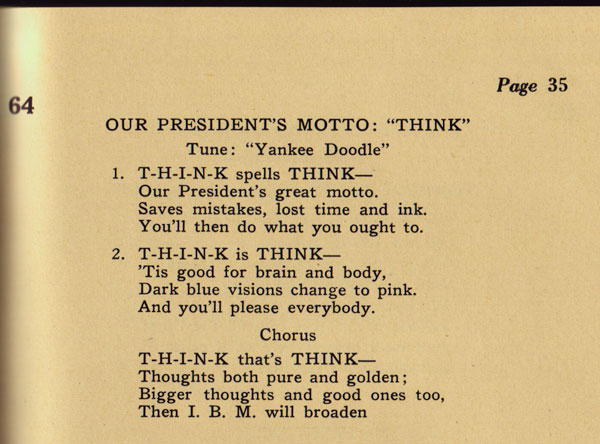
Not all songs have aged so well, such as “To Our I.B.M. Girls”:
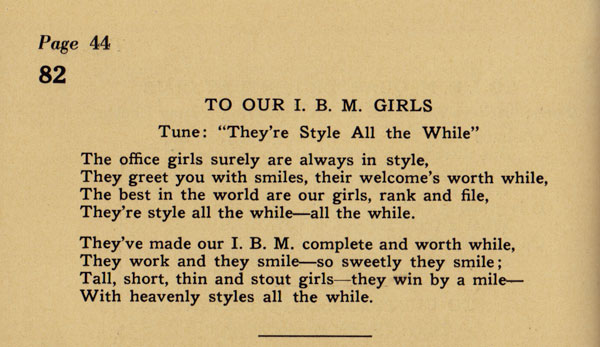
And one parting song, as we come to the 100th anniversary of IBM on June 16th, 2011. It is interesting that in 1937, IBMers considered the founding of the company to have been 1888, not 1911, as indicated in the “Fortieth Anniversary Song of I.B.M”. With a complex corporate history, like IBM has, there are many dates that could celebrated. In any case, if I had any clue what the tune to “Tramp, tramp, tramp, the boys are marching” was, I’d join my colleagues in verse 3.
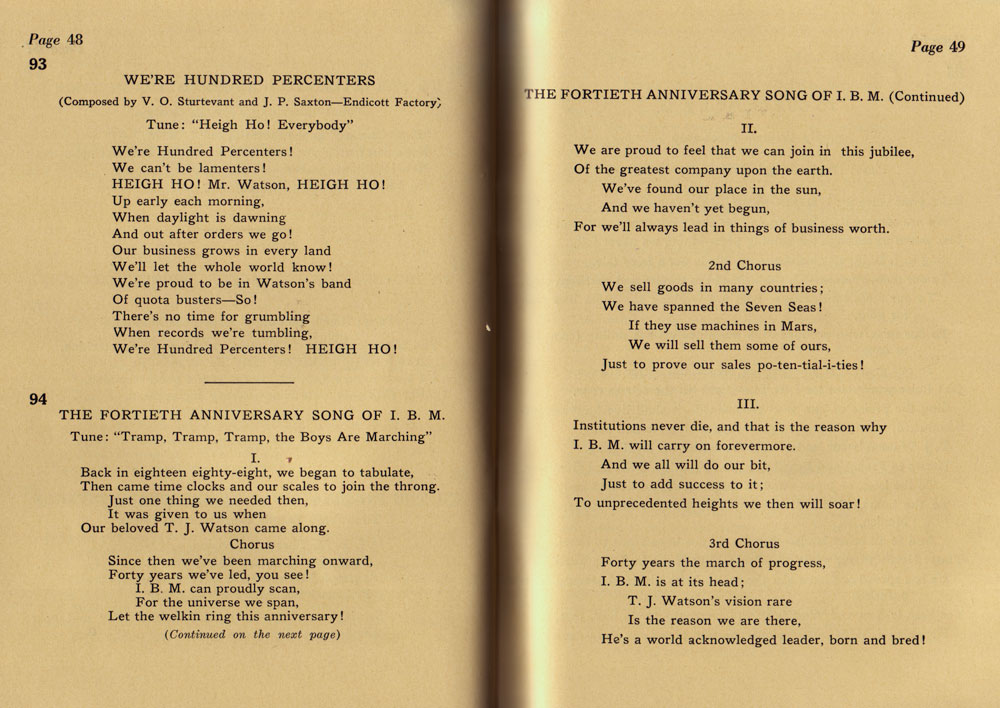
Via http://www.robweir.com/blog/2011/06/songs-of-the-ibm.html

A few years ago there came into my possession a curious piece of IBM history, a thin paperback volume of 54 pages, privately printed, entitled “Songs of the IBM, 1937 Edition”. The opening page lays out the context:
For thirty-seven years, the gatherings and conventions of our IBM workers have expressed in happy songs the fine spirit of loyal cooperation of good fellowship which has promoted the signal success of our great IBM Corporation in its truly International Service for the betterment of business and benefit to mankind.
In appreciation of the able and inspiring leadership of our beloved President, Mr. Thos. J. Watson, and our unmatchable staff of IBM Executives, and in recognition of the noble aims of purposes of our International Service and Products, this 1937 edition of IBM songs solicits your vocal approval by hearty cooperation in our song-fests at our conventions and fellowship gatherings.
It is signed “Yours in International Service, Harry S. Evans”. More on Evans later.In appreciation of the able and inspiring leadership of our beloved President, Mr. Thos. J. Watson, and our unmatchable staff of IBM Executives, and in recognition of the noble aims of purposes of our International Service and Products, this 1937 edition of IBM songs solicits your vocal approval by hearty cooperation in our song-fests at our conventions and fellowship gatherings.

Here’s the index of the 100 songs contained.

After some patriotic songs, it moves to the “I.B.M. Rally Song” called “Ever Onward”:

And then it moves to a series of songs praising Thomas J. Watson. At that point I had an uncomfortable feeling about this. Masses of people singing the praises of their leaders and pledging loyalty is something that is historically tainted. We just don’t do that today, at least not outside of North Korea. But we must be cautious if we try to read 1942 into 1937. In the days before television, and when radio was still young, group singing, to a piano or small band was quite common. Some readers might remember this even reaching into the television era with NBC’s “Sing Along with Mitch” show.
The tradition at IBM was started by Harry Evans in 1925, the man who made IBM sing. Literally. In “The Maverick and his Machine”, Kevin Maney describes:
If Watson sang, IBM would sing. As with the dress code, Watson did not order IBM to sing. That bit of corporate culture started with Harry Evans. Outgoing, attention-seeking, good-natured, wired with energy and shorter than every other man in the room, Evans was always the guy with joke, or the guy willing to laugh at a joke. Watson liked him and promoted him.
Evans loved to sing, and he enjoyed setting his own lyrics to popular songs. …
As the years went on Evans informally assembled quite a few songs about IBM or people at the top of IBM. In 1925 Evans went to Watson and proposed printing a booklet of his IBM songs so that any of the employees could sing them at gatherings. It might be fun, Evans said. Watson liked the idea. At company sales conventions and other gatherings, employees already sang patriotic numbers and songs of good fellowship. Why wouldn’t they want to sing about IBM?
Evans loved to sing, and he enjoyed setting his own lyrics to popular songs. …
As the years went on Evans informally assembled quite a few songs about IBM or people at the top of IBM. In 1925 Evans went to Watson and proposed printing a booklet of his IBM songs so that any of the employees could sing them at gatherings. It might be fun, Evans said. Watson liked the idea. At company sales conventions and other gatherings, employees already sang patriotic numbers and songs of good fellowship. Why wouldn’t they want to sing about IBM?

It was not only the IBM President who had a song. Members of the executive team each had a song, including on to “F.C. Elstob, Comptroller”. How often do you see a song written to honor a comptroller? Not very often.

Innovation and patents were important to IBM, even in 1937, as shown in this song, dedicated to “W.M Wilson, Manager, Patent Department”:

Many of us know of the “THINK” motto that Watson popularized. But did you know there was a song, sung to the tune of “Yankee Doodle”?

Not all songs have aged so well, such as “To Our I.B.M. Girls”:

And one parting song, as we come to the 100th anniversary of IBM on June 16th, 2011. It is interesting that in 1937, IBMers considered the founding of the company to have been 1888, not 1911, as indicated in the “Fortieth Anniversary Song of I.B.M”. With a complex corporate history, like IBM has, there are many dates that could celebrated. In any case, if I had any clue what the tune to “Tramp, tramp, tramp, the boys are marching” was, I’d join my colleagues in verse 3.

Via http://www.robweir.com/blog/2011/06/songs-of-the-ibm.html
Comments